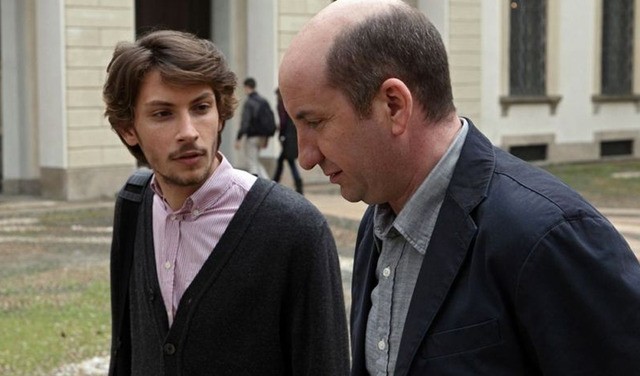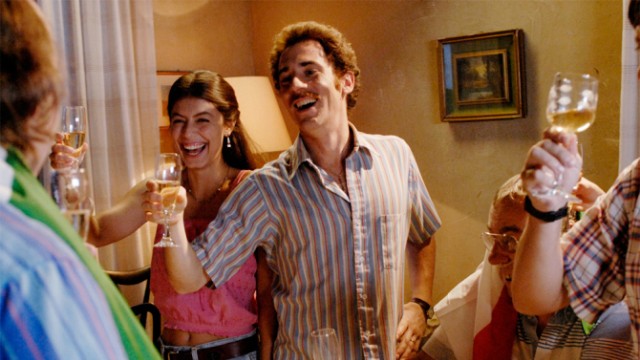-
THOSE HAPPY YEARS (Daniele Luchetti 2013)
DANIELE LUCHETTI: THOSE HAPPY YEARS/ANNI FELICI (2013)

Growing up bohemian in the Seventies
Luchetti's "most autobiographical movie yet" is however not a straightforward account but a riff on a set of characters drawn from his life growing up in the Seventies, which is reimagined conventionally, but with a certain emotion and charm, even if both those qualities are telegraphed operatically. There is the father who wants to be a groundbreaking conceptual artist but comes up only with conventional titillation, who keeps his wife at arm's length while cheating on her with nude "models." There is the artist's withholding, always-critical mother, part of an artistic and intellectual family; the wife's family of people successful in business. And there are the two cute little boys, the older of whom, Dario (Samuel Garofalo) gets a video camera and turns out to be a budding filmmaker, shooting the mother's feminist convocation in the Camargue with the boys and her husband's lesbian art dealer, with whom she has an affair and falls in love. Guido's two big conceptual pieces seem crudely conceived, and there is too much yelling at times. But the film is original for focusing mostly on women. A more mature, less pretty Kim Rossi Stuart is very watchable here as dad Guido, and Micaela Ramazotti is well cast as the well-meaning, tormented wife Serena, who turns out to be the really unconventional one. Whether it's healthy for a kid to having parents who carry out their sexual explorations openly is a question that's left open-eneded, but while director said in a Lincoln Center Q&A that the title is ironic, the narrator twice says he realized the years of his youth were happy, even though the family may not have known it at the time. On the other hand when Dario throws himself in the river after hearing his parents frankly declare their extramarital affairs, it's surely a cry for help. He's rescued and they all drive home, though. There is lots of drama, but nothing too deep here. Sure, this may be more autobiographical than My Brother Is an Only Child, or his 2010 Our Life, but its historical content is relatively vague and its overall shape more familiar. Luchetti remains a reliably entertaining but never very profound director; however, with Serena's lesbian affair he takes a conventional Italian movie in an unaccustomed direction.
Those Happy Years/Anni felici, 106 mins., debuted at Toronto Sept. 2013 and showed at some other big festivals including London and Hong Kong. It opened in France 28 May 2014 under the title Ton absence (Your Absence), with only fair reviews (AllocinÚ press rating 3.1). Screened for this review as part of Open Roads: New Italian Cinema at Lincoln Center 6 June 2014, where it was presented as the opening night film.
Last edited by Chris Knipp; 06-08-2015 at 11:33 PM.
-
A LONELY HERO (Gianni Amelio 2013)
GIANNI AMELIO: A LONELY HERO/L'INTREPIDO (2013)

GABRIELE RENDINA AND ANTONIO ALBANESE IN A LONELY HERO
Parable or ramble?
Amelio is a great director but sometimes he seems to be treading water. His concerns simply vary, though they are never far from social issues, and a tricky relationship between father and son is often present. Clearly L'Intrepido, which considers the beauty of work and the pain of unemployment, is meant as a vehicle for the appealing and soulful Antonio Albanese, and he stars in a fantasy about a 48-year-old divorced man with a grown son and an imaginary occupation, "il rimpiazzo," or "filling in," where the character, Antonio Pane, takes on any job, selling roses in restaurants, packing fish, taking apart wrecked cars, working in a restaurant, but each time only for a few hours. Amelio and cowriter Davide Lantieri seem to improvise the plot as they go along, reshaping the concept. At first Antonio seems charming, Chaplinesque, then a bit nutty, then sad, and so do the young woman he befriends and his saxophone-playing son Ivo (Gabriele Rendina), who first seems happy and accomplished and uncomplicated, then tormented by crippling panic attacks. Antonio's "job" turns out to be a coverup for being out of work. But as the film meanders from one angle to another, you begin to wonder about Amelio here: what was he thinking, making a full-length feature that is so meandering, random, and uneven in tone?
A Lonely Hero/L'Intrepido, 104 mins., debuted at Venice, August 2013, also showed at Toronto, London, and Hong Kong festivals. Screened for this review as part of the Open Roads: New Italian Cinema series at Lincoln Center 5 June 2014.
Last edited by Chris Knipp; 01-02-2015 at 02:37 PM.
-
LONG LIVE FREEDOM (Roberto And˛ 2013)
ROBERTO ANDĎ: LONG LIVE FREEDOM/VIVA LA LIBERT└ (2013)

TONI SERVILLO, MANIC, IN LONG LIVE FREEDOM
Fooling the public some of the time in a quiet political satire anchored by Toni Servillo
When Enrico Olivieri, the failing chief Italian opposition leader, goes walkabout in Paris with an old girlfriend after an especially depressing electoral defeat in Rome, his panicked political handlers, who don't know where he has gone, replace him temporarily (or permanently; it's left vague) by his literally crazy identical twin, pen name Giovanni Ermani, a philosophy professor whose unstable condition has led to a long sojourn in a mental institution. Welcoming a chance to pose as Enrico (a game they played in youth), Giovanni delivers odd pronouncements and erratic behavior that make the fake Enrico a great success and rejuvenate his party. And˛'s Long Live Freedom is part fantasy, part rather obvious, but certainly welcome, political satire.
The implication that even a guy just out of the nut house can govern, or at least enunciate policy principles, better than the men in power may be a bit heavy-handed, but And˛, whose own novel the screenplay is adapted from, gets in some good digs at the anti-Berlunsconi generation. Its not just an addition to the fun but an essential element that the two twin brothers are played by the brilliant technical actor Toni Servillo, famous for his work with Paolo Sorrentino (Il Divo, The Great Beauty), and one may watch the film just for the pleasure of seeing Servillo at work. As the film oscillates between the fake Enrico in Rome and the real one hiding out in Paris quietly nursing his depression with Valeria Bruni Tedeschi (posing as a filmmaker, as in real life) and her famous Chinese filmmaker husband, Mung (the French-Vietnamese Eric Nguyen), And˛ provides good material for the crazy twin; but nothing worthy to balance it occurs in France, where the real Enrico's helping out with kids and a film production with Danielle (Bruni Tedeschi) is no substitute for soul-searching or moral development.
This is material for madcap, fantastic comedy or ruthless satire, but in the event, both Servillo and And˛ deliver relatively staid performances -- though the restraint still can't make convincing the premise that the entire country would be deceived by an unhinged impostor, even an identical one, and not know Enrico had a twin. The idea somewhat resembles that of Hal Ashby's Being There, from the Jerzy Kosinski novel about a humble gardener whose utterances are taken as political wisdom by the US president. It's the fact that Chauncy Gardner (the Peter Sellars character) is out of touch that turns his words into seeming political punditry. The failure of the real Enrico highlights the left's failure at marketing. Jay Weissberg, writing about the film for Variety when it debuted in Italy in February 2013, observed that its merit is sufficient to get it out from under the shadow of Sorrentino," (thinking of Servillo's most famous role as the immortal politico in Il Divo,), but that And˛ "doesn’t quite manage to make the hoary conceit of identical twins feel fresh." Certainly as Weissberg noted, Servillo as the crazy twin is fun, his manner always threatening to go over-the-top but remaining convincing. The actor's turn as the real politician twin is in the more familiar range of his buttoned down, overly staid characters, though Servillo is always a pleasure to watch. Roberto And˛, whose earlier film reviewed here (Open Roads 2007) was a show of beautiful style without much substance, delivers both classy looks and content this time, but in the development of the story there's a sense of various missed opportunities.
Long Live Freedom/Viva la libertÓ, 93 mins U.S. Premiere. Screened for this review as part of Open Roads: New Italian Cinema, at Lincoln Center, New York, where it played Friday, June 6 and 1:00pm Saturday, June 07. The film opened in Paris in Feb. 2014 to only so-so reviews (AllocinÚ 3.2). US theatrical release coming 7 November 2014 (2 January 2014 Bay Area).
Last edited by Chris Knipp; 05-14-2023 at 06:28 PM.
-
I CAN QUIT WHENEVER I WANT (Sydney Sibilia 2014)
SYDNEY SIBILIA: I CAN QUIT WHENEVER I WANT/SMETTO QUANDO VOGLIO (2014)

Heated-up comedy about overeducated drug dealers
A topical Italian theme is of young men whose university education can't lead to commensurate professional opportunities and find their efforts trumped by others manipulating bribes and favors. Here, debut director Sydney Sibilia, who is mad about American movies and TV series, emulates them to a fault with a loud and unruly comedy of amateur criminals that only makes one nostalgic for Italian classics like Big Deal on Madonna Street. What has been added are high-decibal music, drugs, and vulgar language. This time there is a scientist, a mathematician, an anthropologist, Latin scholars, and so on whose poor employment leads them to accept the scheme of one of their number who designs an Ecstasy-like drug with a different chemical formula that is not on the Italian government's list of illegal substances. What they leave out of their calculations is a drug kingpin whose territory they are impinging on. The loud, precipitous action, vivid color, and noisy music and Roman settings are infections, if not overwhelming. The cast and crew may be having more fun than we are. Breaks in shooting reportedly had to be taken to stop laughing at the antics of the handsome comic leading man Edoardo Leo, who plays Pietro, the neurobiologist (see photo) who creates the new drug and hatches the plan to make big money skirting the law, gathering together a half dozen of his underemployed university colleagues. Given that I Can Quit is full of influences from "Breaking Bad" and other shows, the movie's big Italian success is a sign of Italy's deep infatuation with things American, but also a need to laugh at the country's social and economic injustices. An Italian review of the movie is called "'Big Deal on Madonna Street' at a time of 'Breaking Bad.'" The difference is that at the time of Germi's Big Deal (1958), Italian filmmakers were in the vanguard both in comedy and serious films; now they feel the need to see their own experience through the filter of American TV. Scenes show Pietro dealing with a thuggish university superior who is strictly interested in making lucrative deals. He has Latinist colleagues who work for a Pakistani boss at a gas station. Another in a typically funny, over-the-top scene tries in vain to pretend he never finished high school to get an illegal job. Even the rival drug kingpin turns out to have a specialized university degree. In his family life Pietro is retro: he must hide the facts from his shrewish, suspicious wife Giulia (Valeria Solarino). Needless to say, the social issues referred to here have been seriously addressed in quite a few recent Italian films. Facing the inroads of downsizing or other financial disasters was taken up in Silvio Soldini's memorable Days and Clouds, (Open Roads 2008) and this theme got a more downbeat treatment in Ivan De Matteo's Balancing Act (New Italian Cinema, SFFS 2012). Giovanni Avellini's Some Say No (New Italian Cinema SFFS 2011) showed young people revolting against the pervasive injustice of Italian corruption and favoritism.
I Can Quit Whenever I Want/Smetto quando voglio, 100 mins., debuted in Italy 6 Feb. 2014. Screened at its US premiere in Open Roads: New Italian Cinema at Lincoln Center Fri. 6 June 2014. It showed also Sun. 8 June.
Last edited by Chris Knipp; 01-02-2015 at 02:39 PM.
-
THE FIFTH WHEEL (Giovanni Veronesi 2013)
GIOVANNI VERONESI: THE FIFTH WHEEL/L'ULTIMA RUOTA DEL CARRO (2013)

ELIO GERMANNO AND ALESSANDRA MASTROARDI IN THE FIFTH WHEEL
Saga of an ordinary man
In this sometimes winning and always tumultuous Italian drama, appealing for its lead performance by Elio Germanno of Luchetti's My Brother Is an Only Child, here playing Ernesto, a Roman everyman is followed from childhood up to middle age. Germanno, who at thirty-four already has 49 film credits, also played a family striver in Luchetti's 2010 Our Life. (SF New Italian Cinema 2011). Ernesto is called a loser by his father early on, and his various efforts to find interesting work fail. Ernesto winds up working for his dad, later running his own moving company, really shouldering symbolic heavy burdens up and down stairs despite having a bad back. A friendship with an eccentric "pop" artist (Alessander Habe) who does giant Seventies-style collage-paintings gets Ernesto close to success and fame, though he only winds up delivering the artist's paintings to rich buyers. Again and again the movie underlines the inequalities of Italian and particularly Roman life, while affirming Ernesto's soulfulness. To underline his everyman-ishness, Ernesto and his family, both generations, are depicted as passionate football fans, reciting the names of the favorite team's main players being a requirement at each birthday celebration. Things get most satisfyingly corny at the end when Ernesto frantically searches in the Rome city dump for a lost winning lottery ticket, then tells his wife he's already won the lottery -- just having his life.
Besides its sentimental celebration of being Roman, honest, and average, The Fifth Wheel is is a quick runthrough of recent Italian history. So Ernesto and his coworkers get held in a building just as the Aldo Moro assassination has occurred, Bettino Craxi is showered in pennies by an angry crowd, and eventually a row of Berlusconi campaign posters appears, and one of Ernesto's more dubious, but useful, associates sings the praises of the rich politician at the dinner table. Meanwhile a succession of scenes show Ernesto's coworkers becoming more and more crooked, particularly his moving company partner Giacinto (Ricky Memphis), who gets involved in a socialist party scam of switching receipts. Lots of the improprieties of the Seventies and Eighties are superficially alluded to in in this good-natured but never profound film, whose protagonist remains a Forest Gump-like blank, surrounded by the kind of boisterous, noisy Italian family we've seen in many pictures before. Italians must like this kind of movie, since they make so many of them, but this is not one of the memorable or original ones. Even the sympathetic Elio Germanno can be considered rather wasted.
The Fifth Wheel/L'ultima ruota del carro, 113 mins., debuted at Rome out of competition Nov. 2013 as the opening night film and opened theatrically in Italy a week later. It was screened for this review 6 June 2014 as part of Open Roads: New Italian Cinema at Lincoln Center, its US premiere, where it also played 11 June.
Last edited by Chris Knipp; 01-02-2015 at 02:40 PM.
-
TIR (Alberto Fasulo 2013)
ALBERTO FASULO: TIR (2013)

The voluntary servitude of relatively good money in a pan-European market
The hardworking, sincere Italian filmmaker Albert Fasulo's debut feature, which some have called "neo-neorealism," is a docudrama using actors in authentic found settings to present socio-economic reportage in dramatic form. In Tir the settings are not glamorous, though they provide the glamor, or shock, of the authentic. The protagonist, Bronko (Bronko Zavrsan of No Man's Land), drives a "tir" or big rig tractor trailer all over western Europe. His Italian employers constantly push him and his coworkers to give up sleep time and add to driving time to make deadlines and satisfy clients. Bronko, like his co-driver Maki (Marijan Sestak), with whom he is working at first, is a composite based on Fasulo's three-plus years of research accompanying many different drivers on their trips. Fasulo chose a Croatian rather than Italian lead because today the majority of these drivers are Eastern European. Bronko is a former schoolteacher who drives big rigs for an Italian shipping company all ll around western Europe. He accepts being cut off from his family for lengthy periods because this way he can earn around $2,00 a month, three or four times what a teacher gets at home, besides which, his teaching job was not secure.
The director also operated the camera, living in the truck with Zavrsan for most of the four months during which he shot the film. Zavrsan likewise is living the experience he is performing. In today's Italian cinematic scene of glossy, feel-good films, Fasulo's authenticity created such an impression that Tir won the top prize at its debut in the Rome Film Festival in November 2013. There is something tonic and fresh, in an Italian context, anyway, about a movie that doesn't go for glitz or entertainment. But it's only fair to add, as Jay Weissberg of Variety wrote from Rome, that while Tir is "solid" and "intermittently engrossing," it's "rarely vital," and it does "perhaps too good a job of showing the boredom of the long haul."
Tir is even more monotonous, or at least harsher, than the much admired little Latin American truck-travel docudrama Las Acacias (ND/NF 2012), Pablo Giorgelli's closely observational film set in a vehicle loaded with lumber that's driven all across Argentina. From start to finish of Giogelli's film the driver has a hitchhiker, a young woman with a cute little baby in tow. Contact between the two adults is shy and reserved, but there's a kind of sweet romantic pull. Fasulo is dealing with a more widespread and specific phenomenon. Bronko is driving a big rig that's like many others, one equipped with modern electronic maps and a device for drivers to clock in and out, among other things, an essential transport vehicle that's part of a network of networks in which the driver is only a pawn in the game, though an essential one. Most of the time Bronko is alone, if connected to home by cell phone, so far less cut off than a nineteenth-century indentured sailor spending two years before the mast, but still in a sense trapped in limbo. When Bronko and Maki are together then share meals by the side of the truck and talk. Maki wants to quit as soon as he can. Broko gets calls from his wife Isa (Lucka Pockaj that are annoying, even maddening at times. She leads him to believe the mechanic that fixed her car's lights went out drinking and dancing with her and a friend and they were tempted to do more. Another time Isa calls saying a temporary teaching job has come up for him, but he must annoy her by rejecting it, because the money and security won't be sufficient, though he is choosing a longly life thousands of kilometers from home over being with his family working at a quiet, civilized job in his own native land. Later Bronko agrees grudgingly to let his grown son have a large block of his savings for the down payment on an apartment in town. His wife calls soon after, furious after learning about this and insisting the savings are her and Bronko's retirement account. Bronko is helpless as these conversations wash over him, so numbed by the long tiring drives at times he barely knows what day it is.
Sometimes the load and even the truck can be switched by the company at the last minute, most tellingly, near the film's end, going from earlier potatoes and apples to a truck full of live pigs, a burden Bronko does not know how to deal with. The driver of the pig truck has just gotten fed up and bailed from his job. Bronko has to fill in and save the pigs. Patience is required to watch all this. Fasulo cunningly edits to convey the sense of a good long stretch of real time. But imagine the patience required of these drivers. Fasulo's film may be slight, if original seen in an Italian context; but as a contribution to a cinema of social and economic issues, it has a place.
Tir, 90 mins., debuted at Rome, with the prize mentioned; also played at Belfort and Vilnius. Screened for this review as part of Open Roads: New Italian Cinema at Lincoln Center 7 June 2014. At the Lincoln Center Q&A Fasulo reported that Zarvan not only got his trucker's license for this role but was officially hired for by the trucking firm, which commended him on the thoroughness of his preparation. This makes the performance and the shoot scrupulously true-to-life, as well as informed by Fasulo's years of research. In this case as Weissberg suggests, the Rome prize is as much for the ideas and information the film conveys and its authenticity as for the film itself.
Last edited by Chris Knipp; 01-02-2015 at 02:42 PM.
-
QUIET BLISS (Edoardo Winspeare 2013)
EDOARDO WINSPEARE: QUIET BLISS/IN GRAZIA DI DIO (2013)

BARBARA DE MATTEIS, LAURA LICCHETTA AND CELESTE CASCIARIO IN QUIET BLISS
Women on the verge of a nervous breakdown
In Edoardo Winspeare's turbulent, shifty Quiet Bliss (In grazia di Dio) a family cedes to debt and Chinese competition in making high fashion wear for Milanese couturiers and must close their small clothing factory, sell it and their house, and move to their property overlooking the sea, which includes an olive grove. Back to the Land. But Quiet Bliss? Hardly. The English-language title is ironic if not simply off-the-wall. Four women of three generations are thrown on their own devices, and at each other's throats, while men hover on the periphery, only causing trouble. Before the move, two men, dad Croccifisso, (Antonio Carluccio) and brother Vito (Amerigo Russo) get caught while marooned in a stolen boat in some stupid but unspecified illegal venture and go to jail. Vito gets out and takes his family away to the north. This movie is like an opera in which instead of singing arias, the ladies and an occasional man periodically haul off and scream invective at each other, in dialect. The effect is wearing, if intermittently involving. As time goes on and the various plotlines sputter, it turns into a neorealist soap. The patois is thick and the setting is the stark but lovely Finis Terrae, Leuca, where the Adriatic meets the Ionian sea within sight of the Greek coast. This is in the region of Lecce, Puglia, in the tip of the heel of the "boot" of Italy where the Austrian-born director grew up, and with which he seems obsessed.
The film is notable not only for sunlit locations but Winspeare's use of non-pros throughout. In charge of the family is Adele, played by Celeste Casciario, the director's wife, a ravaged Sofia Loren type. It's Adele who decides the factory must close and the property must be quickly sold (at a considerable loss). Adele then persuades her frivolous sexpot daughter Ina (played by Laura Licchetta, Winspeare's stepdaughter), still in school and making out with various young men in cars, and her plump sister Maria Concetta (Barbara De Matteis), who wants to become an actress, to join her still-attractive mother Salvatrice (Anna Boccadamo) on the little farm. Adele begins selling their fruit, vegetables, and eggs to businesses in town to pay off outstanding debts. The patient, pious Salvatrice takes up with a 65-year-old local farmer, Cosimmo (Angelino Ferrarese), and a late-blooming romance is born that repels the obstreperous, foul-mouthed Ida. The nicest person in the story (and the most believable non-actor) is Adele's former classmate Stefano (Gustavo Caputo), a shy government bureaucrat who lives with his 90-year-old mother. Stefano spots Adele, whom he evidently had a crush on, in an office of Equitalia where he works protesting her debts, and he becomes a good samaritan, or tries to, beginning with adjusting down the debt. His efforts to tutor the lazy, stubborn Ina aren't much of a success at first, and Adele is hard hearted toward most men, including him. She and Maria Concetta hurl plenty of abuse at each other, and Maria Concetta misses a big audition for Ozpotek due to her sister's hard-heartedness, indifference, and obsession with debts. An inexplicable interlude when Adele treats herself one night to a costly dress and solitary fancy dinner suggests her responsible ways may indeed mask the selfishness the other women accuse her of.
The film loses focus in its latter half and suffers from an unappealing and somewhat opaque protagonist and a failure to develop other characters except peripherally. Prison visits, Salvatrice's wedding to Cosimo, and a subplot involving Ina's unintended pregnancy don't make up for this. A feel-good final tableau of reconciliation among the women seems hastily tacked on and leaves everything still dangling after over two hours of rambling episodes. The production is interesting for its unusual setting and "homemade" nature, including not only non-actors (though more refrained and subtle pros might have been better) but eco-sensitive use of local products and avoidance of gas emissions, more than for the erratic, overlong film. Writing by Alessandro Valenti, Anna Boccadamo, and Edoardo Winspeare and editing by Andrea Facchini could have used greater selectivity and focus. There seem to have been no English-language Berlinale reviews. One negative one in Italian on "filmtv" by Maurri 63, is brutal but makes good points. The film's Salentino dialect was subtitled for Italian viewers.
Quiet Bliss/In grazia di Dio, 127 mins., debuted in the Panorama section of the Berlinale 6 February 2014 and was released in Italy 27 March. Screened for this review as part of Open Roads: New Italian Cinema at Lincoln Center 9 June 2014.
Last edited by Chris Knipp; 01-02-2015 at 02:43 PM.
 Posting Permissions
Posting Permissions
- You may not post new threads
- You may not post replies
- You may not post attachments
- You may not edit your posts
-
Forum Rules





 Reply With Quote
Reply With Quote






Bookmarks